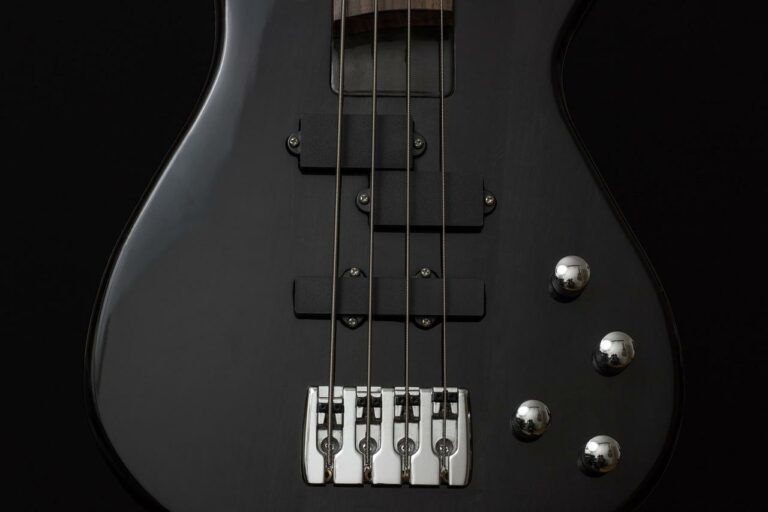Electric bass guitars also called electric bass or just bass, are like electric guitars in construction and working. They usually have fewer strings and are larger than electric guitars. Bass guitars are used to play the basslines in a song. And together with other instruments like a drum kit, form the rhythm section.
Even though bass guitars are harder to discern in a song with multiple instruments being played at the same time. It would be quickly noticeable if the bass guitarist just stopped playing the bassline, making the song or performance sound hollow. This makes bass a very important part of the rhythm section.
On the other hand, the electric guitar is much more versatile and is used for rhythm or melody and usually both. With a myriad of amps and effect units, there is virtually an unlimited number of tone shaping that is possible with electric guitars. This makes them one of the most popular musical instruments in the world.
So, is the bass easier than a guitar? To give you a quick answer:
The bass is easier to get started with, you can think of it as more beginner-friendly than electric guitars. However, that is it. On a long enough timeline where we’re talking about getting at a very good or advanced level. Any advantage you had as a beginner subsides and both bass and electric guitars, like any other musical instrument, are equally easy or hard and will probably take a lifetime to master.
As you keep learning and practicing, you see that even though similar in look and construction, bass and electric guitars are very different instruments and serve different roles and pose different challenges. And both are easier or harder to learn depending on your inclination, passion, and goals.
The question then becomes what would be more suitable for you in your music journey rather than which would be “easier” to maybe get started with. After a couple of months of dedicated practice with a bass or maybe six months with a guitar, you’ll more or less be at a similar level for each instrument. At this point, though you’ll be looking at different challenges and goals, they’ll not be any easier than the other.
Therefore, it is important to choose an instrument that you actually would like to play rather than choosing one just for the ease of learning in the beginning phase.
In this article, we’ll be taking a close look at how the bass and electric guitars are different from each other and how they are utilized. We’ll learn how they serve different purposes and how one may be more suitable for you than the other.
Bass Guitar vs Electric Guitar
Strings And Tuning
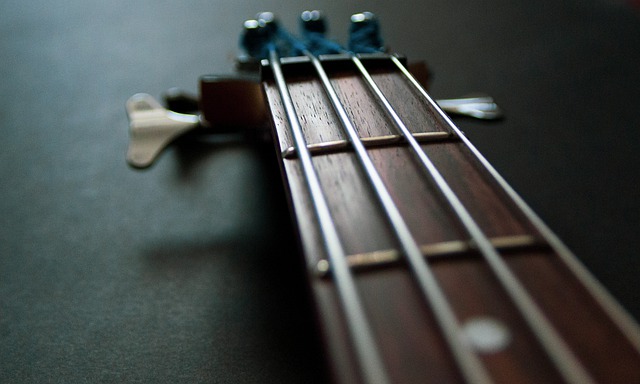
Standard bass guitars have four strings compared to six for a guitar. The tuning E–A–D–G is the same as the lower 4 strings of a guitar but an octave lower.
The strings on a bass are much thicker than an electric guitar’s and therefore comparatively hard to press down on the fretboard.
While bass guitars only have four strings the width of the fretboard is like a guitar’s fretboard and therefore the string spacing is much wider. This can help beginners play notes better as there is enough room between strings and there is less chances of unintended touches to other strings.
Design
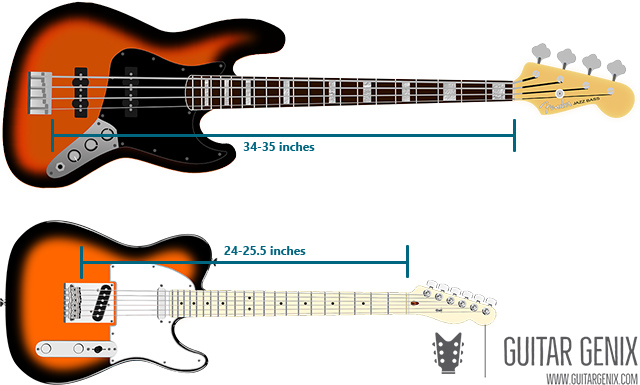
Standard bass guitars are bigger and heavier than guitars. Bass guitars are around ten inches longer at thirty-four inches compared to a twenty-four-inch regular guitar.
Bass guitars are also usually heavier and can be anywhere between 8-10 pounds or even more, on the other hand, electric guitars are usually in the 6–10-pound range.
Both bass and electric guitars are solid-body, but semi-hollow or even full-hollow body electric guitars are available. These hollow-body guitars have a different timbre than standard solid-body electric guitars.
Price
In the past, the price of bass guitars was generally higher than electric guitars but nowadays the price is more or less the same with bass guitars usually being just a tad bit higher.
You can find cheap and expensive kinds of both bass and electric guitars.
Sound Palette
Guitars have more diverse sound-producing capabilities compared to bass guitars. Electric guitars are very versatile instruments, and their tone is usually shaped using effect pedals and amps, etc. On the other hand, while bassists also use effect pedals, using too many effects is not common and is seldom seen.
The pitch range of the electric guitar is also greater because of two more strings they have compared to a standard bass guitar. A typical electric guitar has a range of E2 to D6 while a standard bass is in the range of E1 to G4.
As you can see, there is a whole extra octave in the lower end in the case of a bass guitar but it is missing the high-end pitches of electric guitars.
It is usually harder for untrained people to “hear” (but it can be felt) the bass guitar in a song unless there is a very distinctive bassline or a bass run. Drums or chords played by the rhythm guitarist in the rhythm section usually subdue the sound of the bass.
On the other hand, electric guitars usually being part of the melody or rhythm are easily audible and recognizable.
So while electric guitars are more versatile and allow for wider opportunities for musical expression. A bassline that requires a bass guitar would sound empty and hollow without one being played. It is rightly said that guitars provide variety while bass provides the impact!
A juicer timbre, abundant overtones, better harmonics, and powerful low end are some of the traits of bass guitars that make them so powerful in a band and in music. While these qualities are more suited for basslines, some songs use bass guitars in a more melodic manner much like a lead guitar.
Purpose
Bass is lower sounding and serves a different purpose and is generally used to play the bassline of the song as a part of the rhythm section. On the other hand, electric guitars are primarily used as a lead instrument but in a band with many instruments and musicians, they are also used as a rhythm instrument.
Even though many people wouldn’t be able to “hear” or discern the bass in a song they would certainly feel it. If you removed the bass track from the song, it would sound empty. This is why some people like to say that bass guitars and guitarists are underrated.
Why Bass Guitar is Easier to Learn Than Electric Guitar
Strings and Fret
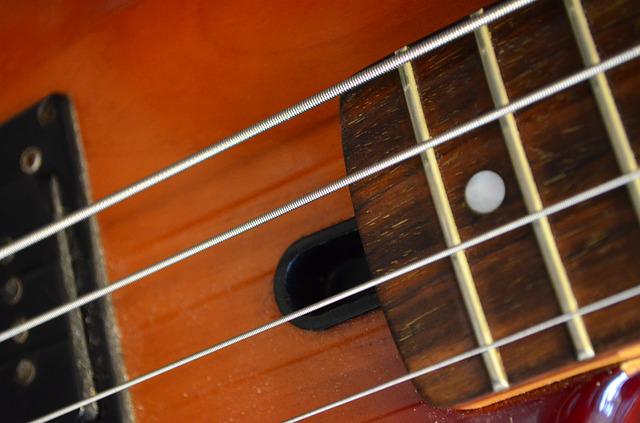
As previously discussed, bass guitars have fewer (four) strings, and the strings are further apart compared to an electric guitar. This makes fretting and changing notes easier and there is less chance of hitting an undesired string.
While not a big deal after some time, not being able to get a crisp and clear note during early practice is a cause for frustration among lots of people which may hinder their progress.
Basslines vs Melody
Basslines are almost always simpler and more repetitive than guitar chords. In many cases, the basslines would consist of a repetition of a few notes in a sequence being played throughout with very little change. The change or progression of notes is also almost always relatively slower.
On the other hand, guitar players usually play chords instead of just notes. The chord changes (chord progression) which form the basis of the melody or rhythm are very quick and varied. And even during solos, even though the player may be playing single notes, the note changes are very fast and a lot more complex techniques are usually employed which require a lot of practice
It is not to say that bass players are less skilled or do not employ more techniques. At the very top level all musicians, be it bass players or guitar players are very competent and skilled.
For someone starting out, a bass would generally be easier to get decent at. The techniques and overall practice and expertise required to be at a decent amateur level are lower for a bassist than it is for a guitarist.
Fingerpicking vs Pick Strumming
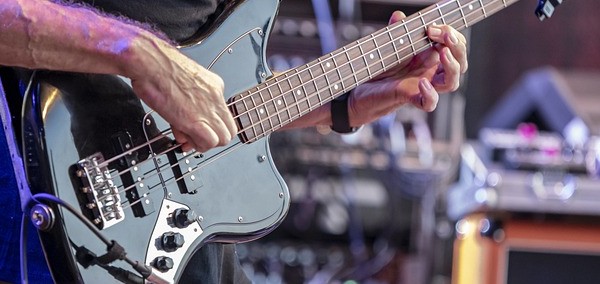
For some people, it takes a little while to get comfortable with the idea of using a pick which is usually what many electric guitar players use. For bass guitar, fingerpicking is the default.
While not always the case, people usually have a far better feel and control of their fingers than a pick. You can get a lot more “feedback” from your finger directly touching the strings than having a pick in between.
While most bassists use their fingers, some may use a pick if that’s what they are more comfortable with.
Notes vs Chords
Basslines as mentioned above mostly contain different notes being played in succession. A chord, which is a set of notes being played simultaneously, requires multiple strings to be pressed together on the fretboard.
Although, a learning phase that people usually get over rather quickly, chords are in fact tougher to strum.
Barre chords, which are feared by beginners, require not only multiple strings being pressed down simultaneously by different fingers, but multiple strings being fretted by a single finger, usually the index finger.
Compared to this, bass players usually play only one or two notes at a time and mostly just one note which is easier for most people to get good at in a shorter amount of time.
Career
Guitarists usually get more spotlight and fame, but there is usually more competition as well. At a time, there could be ten people looking to join a band but maybe two or three bassists. So, it might be easier to join a band as a bassist than as a lead or rhythm guitarist.
Some people like to think that bass guitarists are basically failed guitarists, which couldn’t be further from the truth. Indeed, some guitarists transition to bass guitars but it is usually because they found that it suits them better.
Take for example one of the best bassists of all time, Carol Kaye. Her great career as a bassist started when the bass player didn’t show up for a performance. After having played guitar for years she found that she liked bass much better!
Why Bass Guitar is Harder Than Electric Guitar
Harder to Handle
Bass guitars are bigger and heavier and are made of solid wood. The fretboard is also longer, and the strings are thicker. Thicker strings require a lot more finger strength (and build-up of calluses) than a regular guitar to get good, clean-sounding notes.
The length of the fretboard and the size of the frets means you have to stretch more to reach and change notes. Having smaller hands would mean additional difficulty initially until you build some finger dexterity. For many people, this wouldn’t be a deterrent, unless you’ve very small hands and shorter fingers.
Also if you play the guitar, holding a bass for the first time may feel off, but it gets better. It is all about practice and habits.
Do remember that many bassists have smaller hands, even female bassists who have, comparatively even smaller hands. A smaller hand would indeed make it harder to stretch and play many progressions, but it gets better with practice. It is more an inconvenience in the starting stages than a major deterrent.
Less Room for Error
Timing is a major part of basslines and has to be precise, unlike a guitarist who has some leeway with the timing.
A bass guitarist with an off timing would make the overall song or performance sound bad while a guitarist can get away with some mistakes.
The bass guitar player as a part of the rhythm section also has to be in sync with other members of the band, usually the ones who handle percussion, like drums. For tougher rhythms and harmonies, keeping in sync with band members who handle percussion can become challenging and the room for error is very small.
Role
Bassists usually are not the center of attention in a band — the guitarists often are. Depending upon your personality, one would suit you better than the other if you wish to start or join a band.
Some people like the attention, and some people do not. It is more of a preference than a downside.
Closing Thoughts
It is also abundantly clear that the difficulty level should not be a deciding factor to start with bass over the guitar or vice-versa. So a question of whether a bass is easier than a guitar is trivial and redundant. Your choice, therefore, should be made on your personal preferences and end goals.
You can also transition from one to the other or even learn both. So, the need for trying to come up with the “best” instrument may itself be inessential.

